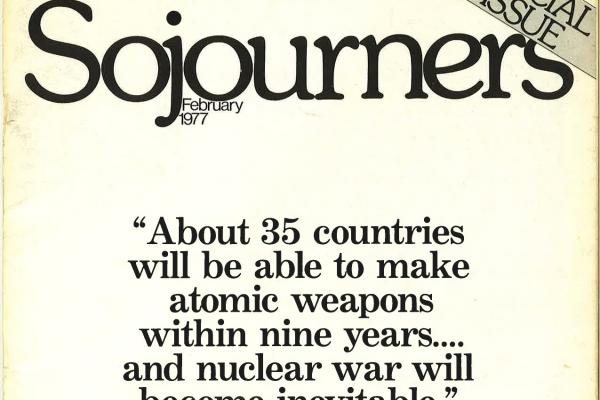ON JULY 16, 1945—70 years ago today—the United States Army tested the first nuclear weapon in Alamogordo Air Base in New Mexico. "For the first time in history there was a nuclear explosion," wrote General Leslie Groves two days later in a memorandum to the U.S. Secretary of War. "And what an explosion!" Less than one month later, bombs were dropped on the Japenese cities of Hiroshima and Nagasaki. More than 150,000 people were killed instantly and other deaths from radiation exposure followed.
In February 1977, Sojourners published our first issue on nuclear disarmament. “The physical death from the bomb may come sometime in the future,” wrote Liz McAllister in that issue, “but the spiritual death is obvious all around us.”
Those who’ve read Sojourners since the early days know that we’ve long voiced our opposition to nuclear weapons. As Christians, it was clear to us that making, possessing, and using these weapons was sin—a real and imminent threat to the physical and spiritual integrity of beings formed in the image of God.
But for many Christians today, the call to oppose nuclear weapons has neither been obvious nor urgent. To many people of faith, the threat these weapons pose has become remote, an outdated nightmare from a sepia-tinted past. And in a world where there are so many things to care about—mass incarceration, climate change, immigration reform, racism, to name a few—Christian opposition to the bomb lost momentum.
There are signs that’s about to change. “Each one of us becomes responsible for the crime of war by cooperating in its preparation and in its execution,” argues Karen Swallow Prior, quoting U.S. Air Force chaplain Father George Zabelka in our August cover story, "Nukes and the Pro-Life Christian." “Silence, doing nothing, can be one of the greatest sins.”
While she writes with the same conviction of her 1970s predecessors, Prior hardly seems like a typical anti-nuclear protester. A professor at Liberty University, a school founded by Jerry Falwell and strongly associated with the Religious Right, Prior’s perspective on nuclear weapons is rooted in her pro-life commitments: “All human life begins the same way,” she writes. “Yet there are so very many ways to destroy it.”
For us, Prior’s story is a hopeful sign; if there’s a future for the Christian witness against nuclear weapons, it’s going to require the participation of Christians across the theological and political spectrum.
Japanese theologian Atsuyoshi Fujiwara agrees. As we remember the 70th anniversary of the bombing of Nagasaki and Hiroshima, Fujiwara reminds us that most Japanese remain opposed to making, keeping, and using nuclear weapons. And for Christians, he writes, the example of Jesus calls us further: "to reject not only atomic bombs, but also weapons and violence as a means of forcing one's will on others."
And despite the lack of attention in the U.S. towards reducing our own nuclear arsenal, says Tyler Wigg-Stevenson, chair of the World Evangelical Alliance's Global Task Force on Nuclear Weapons, there are plenty of global examples of young, anti-nuclear activists advocating for nuclear abolition--including many people of faith. "For the first time in history, the three bodies representing global Christianity are actively working for nuclear disarmament," he writes.
Read more in the August 2015 issue of Sojourners online at www.sojo.net/magazine.
Got something to say about what you're reading? We value your feedback!
